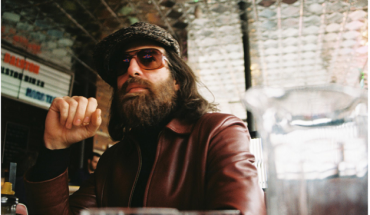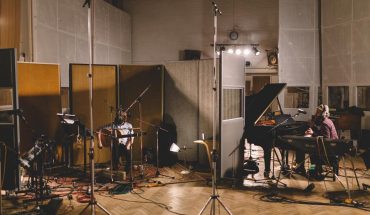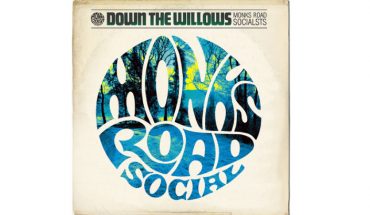The concept album has returned with Waiting Rooms, the second and long-awaited album by Samantha Whates, a Scottish singer-songwriter in whose smiling, gimlet eyes smoulders something rare. The album comes at a curious time in the life of the country and befits a Brexit Britain that has seen us all turning inward, attempting to place ourselves in a new context.
We’re all at sea, or up shit creek, depending on your reserves of optimism, and Samantha is able to express this novel moment as it affects her, and as only she can: lips to mic, eyes closed, guitar in hand. But this is not a political record. Samantha, instead, suffuses her songs with references that twist and bloom from her own experience.
“I’ve been singing since I was a kid,” she says, “but I’ve been playing my own music since I was 20. I had a boyfriend who killed himself, so when my brother gave me an old guitar, suggesting to me that I write, to help me through it, I started then. It doesn’t feel like any time at all between now and back then. I think that writing and performing has prevented me from going down a very bad route, mentally and emotionally. It’s kept me right.”
With Waiting Rooms, she has intuitively chosen a compelling metaphor to capture the national mood of impermanence, for if we’re to be honest with ourselves, this country has lost touch with whatever it once was and – since the referendum – one might argue that the UK has itself been turned into one vast waiting room, its citizens now rising as one from their chairs, knees bent, suspended, waiting to be told how to behave in the new reality.
After 18 years spent living in London, the summation of Samantha’s artistry to date lies in the grooves of this album that was recorded live and on location in various waiting rooms. “Dunoon Pier in the Western Highlands was the most remote location to date, and is no longer in use as a waiting room, but as a community space,” she says.
“We recorded two songs there, ‘Sailors’ and ‘Dylan’s Truth’. Sailors has been arranged for shruti, lute and voice. We went on the ferry from just outside Glasgow with all our recording gear and instruments, including a double bass. It felt so in keeping with the songs we chose to record there – something about the journey on the ferry looking out to the water and seeing the pier appearing in the distance. Knowing it was the first recording. I really got into the feeling of the start of the journey.
“We’ve also recorded in Loughton tube station’s waiting room which absolutely stank and had no electricity. That was done at the end of the night when the last trains were coming in. This was the weirdest one and I felt I was running on adrenaline alone for it. It’s the most real sounding. We started recording while the trains were still running so in ‘Guilty’ [arranged by Daisy Palmer] the recording is bookended with the sound of the tube pulling in and the doors opening and, believe it or not, at the end of the song you hear a train pulling out. We couldn’t believe our luck with the timing. We had to run an extension cable from the cleaner’s cupboard through windows and all over the place. I can’t handle a microwave, so I don’t know how we managed a bass and guitar amp through it.
“And Great Ormond Street Hospital’s main entrance waiting room was used on a Sunday morning. We recorded two versions of ‘I Love My Life,’ which will bookend the album and has two beautiful arrangements by Jamie Doe (a.k.a The Magic Lantern). Emotionally, this one felt quite an extra important one for the record. Poorly children and families watching the recording and clapping at the end of takes felt like a beautiful metaphor for everything that the song represents, which is why it meant so much to record it in that waiting room.
“It’s an album’s worth of songs that I’ve been writing over the past five years, and I’ve recorded it with my brother Douglas, who’s responsible for some of the arrangements. He and I made my first album together [Dark Nights Make For Brighter Days, 2016].”
Were the people she found in the waiting rooms more receptive to listening? “Perhaps. But the point of being in a waiting room is that you’re at the beginning of a journey, and that something might be life changing. It’s every day things I write about, but I like to think my ideas are hopeful and looking to new beginnings. It feels like the subjects of my songs fit with the energies and stories of those rooms.”
This country may be in a slough of despond, but this songstress is not, her craft sustaining her. “The arrangements on this album are unusual. There’s a lute, an electric bass and a shruti box, for example, not just my guitar.” So run-of-the-mill folk this is not. “I’m interested in taking music into spaces where they’re not usually performed and seeing how it sounds. These are rare opportunities to record. A lot of my songs are about home, but some are about second chances, and hope… a light out of a darkness.
“These songs are more conversations about everyday issues, the minutiae of life. They’re not heartbreak or love songs. They’re about, I suppose, trying not to give up on life, and on people.”
So here we are in existential Britain. It’s a raw, difficult time and Samantha sees fit to rise above the fray. “I didn’t want these locations to be romantic old train stations. I wanted them to be at times… a bit crappy, you know?” Like life, I venture. “There are two songs per waiting room, and we did four takes of each song with no overdubs. To be honest, it’s been a ball ache trying to arrange it all. I mean, I’m not a project manager. There’s been a lot of red tape to cut through to organise this.”
She gets the bigger kick from recording live, but she also co-writes and has a side project with Pat Dam Smyth and is one half of the vocal duo, Pica Pica, but would she describe her music as sophistipop, I ask, looking for banter, but she wrongfoots me. “That’s a pretty fucking good term. But no, I play, I suppose, alternative folk. It’s melodic and contemporary.”
On the resurgence of acoustic music, created around the guitar, she says: “At the core of everything is a song, and people are rediscovering the art of song. And finding that core is by picking up a guitar and writing it. Writing is challenging. It can bring me to my knees sometimes, but it is also joyous. I can write a song to order, yes, but writing for myself can take a long, long time. I would rather work in a pub for minimum wage and make music, than not make music.”
It is, therefore, a creative voice like Samantha’s that’s needed at this time of cultural impasse. What she sings has been expunged of easy virtue and marketplace positioning; instead, it is her own truth fully decanted, and right now it is music like this that comes to us as the sweetest of curatives.
Jason Holmes
@JasonAHolmes
Waiting Rooms will be released on Monks Road Records later this year





